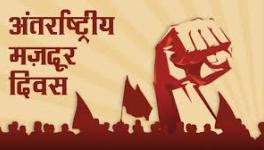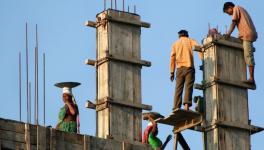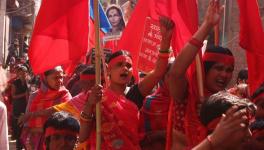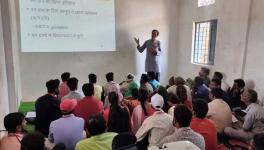Budget Session: Catalyst of Economics and Politics
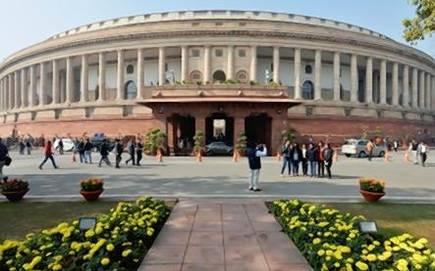
Representational Image. Image Courtesy: Hindu Business Line
The budget session of Parliament is less a week away. The session will begin on 31 January and on 1 February, Finance Minister Nirmala Sitharaman will present the Budget. It will be the eleventh time that the budget presentation will take place on a Saturday. The last time it happened was in 2015. It was the budget presented by the then Finance Minister Arun Jaitley, which restarted the conversation about the GST and set the stage for direct benefit transfer through Jan-Dhan accounts, etc.
The Budget Session is the longest session of Parliament, lasting for approximately eight to nine weeks [30-35 working days] with the sittings divided into two parts. A shorter first part in which MPs broadly discuss the government’s functioning, economic scenario in the country and the budgetary proposals. The houses then take a break. During the break, parliamentary committees take a closer look at the financial plans of the ministries of the government of India. After the break, this scrutiny moves on to the floor of Parliament.
While the focus of the session is on the budget, there is more to the session itself. On the first day of the session, the President will address MPs from both Lok Sabha and Rajya Sabha in the Central Hall of Parliament. In his speech (prepared by the government) he will outline the priorities of the government for the coming year. These priorities will translate into government policy or legislation that the government pilots through Parliament.
During Prime Minister Narendra Modi's first term, 133 bills were passed by Parliament. Another 46 bills which were in the pipeline lapsed after the dissolution of Lok Sabha. In the last six months, many of the lapsed bills, such as the consumer protection, motor vehicles amendment, code on wages, triple talaq etc., have been reintroduced and passed. As a result, there is an almost a clean legislative plate before Parliament in 2020. Which means that the upcoming budget session will act as a weather vane for the legislative agenda that the government intends to roll out over the next four years. While the government has not listed its legislative priorities, some indicators can shed light on the government’s intent when it comes to issues around land, labour and capital.
Let’s take land first. The NDA government’s first legislative attempt in this direction was the 2015 amendment to the land acquisition act. The bill was relaxing the requirements for the acquisition of land for strategic and developmental activities. Stiff opposition in Parliament led to the shelving of the amendment. The government then changed its strategy. It encouraged state governments to amend the central law in its applicability to their states, which many did. Since then there hasn’t been a major legislative push on the subject of land in Parliament.
Over the last decade, successive governments have been working towards digitisation of land records. The 2019 general election manifesto of the Bharatiya Janata Party mentions that this process will be completed on a mission mode basis. The manifesto also talks about second-generation land reforms to ensure title guarantee for the landholder and reduce land-related litigation. Studies have pointed out land dispute litigation accounts for 2/3rd of all pending cases in the country. Another one suggests that land disputes take an average of 20 years to resolve. With a comfortable majority on its own in Lok Sabha and improved floor management in Rajya Sabha, the government could be looking towards fulfilling its electoral promises on land reforms.
On the other hand, reform in the labour sector is something that the government is actively pursuing. In the last six months, three significant bills dealing with the sector have been introduced. The first bill deals health, safety and working conditions in establishments employing more than nine workers. The second bill is the Industrial Relations Code Bill which deals with industrial disputes and trade unions. The third focusses on the social security of workers, like provident fund and maternity benefit. These three bills will consolidate 25 existing laws. The parliamentary committee on labour headed by Lok Sabha MP Bhartruhari Mahtab is currently examining these bills.
In Prime Minister Narendra Modi’s first term, the legislative focus of the government was on the financial sector. Approximately 26% of the total laws passed were from this sector. Some of them being FDI in insurance, GST, the insolvency code, Fugitive Economic Offender law etc. The Insolvency and Bankruptcy Code continues to evolve. In the upcoming session, the government will push for the passage of an amendment to the law. This amendment will set the minimum threshold for initiating resolution by financial creditors and by allottees in real estate projects. The Companies Act has also seen modifications, especially towards decriminalising offences. However, the major announcements for catalysing the economy will have to wait for the budget.
The government’s attention is also towards the use of personal data. The DNA Technology (Use and Application) Bill and the Personal Data Protection Bill have been introduced to provide the regulatory mechanism for the usage of data of individuals. Both these bills are also being scrutinised by parliamentary committees. The DNA bill is being examined by a committee headed by Rajya Sabha MP, Jairam Ramesh. Lok Sabha MP Meenakshi Lekhi is chairing a joint committee of the two houses which is scrutinising the government’s personal data protection bill. The committee process is a structured opportunity for stakeholders to get their voice heard in the lawmaking process.
Parliament and politics go hand-in-hand. During the year, 73 Rajya Sabha MPs will be retiring, many of them during the budget session. The electoral outcomes in states over the last few years will decide whether the government or the Opposition control the decision-making in the upper house. The position of the Deputy Speaker of Lok Sabha is also vacant. It is a position that usually goes to a political party which is an ally of the ruling party. With no coalition compulsions, it will be interesting to see who occupies this position.
Another question that has been actively discussed is the composition of the council of ministers. The current strength of the council stands at 56 ministers. Constitutionally, there is space for 24 more ministers. With a comfortable majority in Lok Sabha, it remains to be seen whether the Prime Minister will expand or reshuffle his cabinet in the coming months. Answers to these political questions and the legislative priorities of the government over the next four years will start becoming clearer when the budget session starts next week.
The author heads legislative and civic engagement initiatives at PRS Legislative Research. The views are personal.
Get the latest reports & analysis with people's perspective on Protests, movements & deep analytical videos, discussions of the current affairs in your Telegram app. Subscribe to NewsClick's Telegram channel & get Real-Time updates on stories, as they get published on our website.









